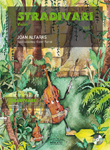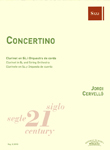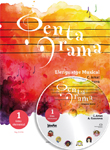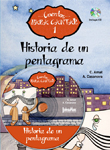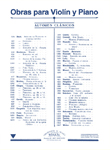Obres per a veu i piano
Wors for Voice and Piano / Obras para Voz y Piano
Voz y Piano
OLTRA, ManuelReg.: B.3892
20,60 €
P.V.P. (VAT included 4%)
Add to cart
- Ensemble: Duos: With piano; With voice.
- Genres: Classical / contemporary: Choir; Chamber.
- Lyric author: GARCÍA LORCA, Federico; QUART, Pere; SALVAT-PAPASSEIT, Joan; VERDAGUER, Jacint; VIUSÀ, Manuel
- Language: Cast/Cat/English
- Product format: Partitura
- Difficulty level: Intermediate-advanced
- Period: 2nd half S. XX - XXI
- Publishing house: Editorial Boileau
- Collection: Siglo XXI
- No. of pages: 52
- Measure: 32,00 x 23,00 cm
- ISMN: 979-0-3503-3824-3
- Available in digital: No
- Available for rent: No
Manuel Oltra was born in Valencia in 1922 but he lived and worked the greatest part of his life in Catalonia. Few composers at the end of the 20th Century and the beginning of the 21st Century have devoted themselves so fervently to our popular music as he did. Although his works include numerous musical genres, he is primarily known for his choral music (especially the harmonization of traditional songs and villancicos) and works scored for cobla, including more than 30 sardanas. In addition, Oltra was a the composition teacher of an entire generation of composers, and one of the finest experts in the techniques of pedagogy for musical composition as evidenced in his exemplary catalogue of works revealing his mastery of harmony, counterpoint, orchestration, instrumentation and analysis.
Due to the unquestionable value of his musical artistry and coinciding with the anniversary of his sad loss, the publishers have decided to recover and make known some of his works which were not published during his lifetime. For many years Editorial Boileau had both a strong professional and personal relationship with this composer to whom our country owes so much. With this publication of previously unpublished works we would like to offer Manuel Oltra our most sincere respects.
The texts of the various vocal works in this collection are by various authors and were composed in the decades of the 1940, 1950 and 1960. With the exception of Danza, all of them have Catalan texts.
Danza is a version for mezzo soprano and piano of the same work originally written for mezzo soprano and orchestra, also published by Boileau B ........ It is based on a brief text by the Andalusian poet Federico García Lorca (1898- 1936), titled Danza en el huerto de la petenera.
Pastorel·la [Dance of the Shepherdess] by Jacint Verdaguer (1845-1902) is a villancico with a pastoral character which describes the scene of the birth of Jesus as seen by a shepherdess who has lost a sheep. The genre of the pastorela is derived from the troubadours and is usually focuses on the meeting of a shepherdess and a gentleman who is courting her. Verdaguer changes the character of the genre by describing a shepherd who finds a new religious love in the adoration of the Christ Child. Manuel Oltra adds music to the text using the same ternary rhythm that recalls the rhythm of El Noi de la mare or Silent Night. It is also notable that the contemplative quality of the reprise, with its ascending arpeggios and Mixolydian harmonies, evokes other popular songs.
Manuel Viusà (1917-1998) was mainly a painter and print maker but was also a notable political figure. Due to his strongly Nationalist beliefs, during the years of the dictatorship he moved to Paris where he continued his artistic activities as well as his support for the Catalan cause. A multi-faceted man, he also wrote and published various books, notably his biographies of Francesc Macià and Lluís Companys. This Nocturn, a love poem set to music by Oltra, was written prior to his exile.
In A Veient Rosie a la finestra for bass and piano, based on a text by Salvador Espriu (1913-1985), an American soldier says goodbye to his beloved before leaving for the war. The composer uses a military march rhythm to depict the departure which is intertwined with a more lyrical passages when the soldier sees his Rosie.
The song is similar to Joan Salvat-Papasseit (1894-1924) Mester de amor and Res es mesquí, both of which have a positive mood and exalt sensuality and the joy of living.
The final song of the collection, Borrissol d’àngel, is based on a delightful and naif text by Pere Quart. The most unusual aspect of this song is its instrumentation: childs or female voice, flute and harp (or piano playing an octave higher). The subject is also based on Christmas.
Danza (letra: Federico García Lorca)
Pastorel·la (letra: Jacint Verdaguer)
Mezzo o Baritono y Piano Nocturn (letra: Manel Viusà)
Barítono y piano Veient Rosie a la finestra (letra: Joan Salvat-Papasseit)
Mester d'amor (letra: Joan Salvat-Papasseit)
Res no és mesquí (letra: Joan Salvat-Papasseit)
Borrissol d'àngel (letra: Pere Quart)
Veu, Piano (o Arpa) i Flauta

